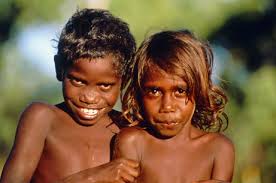~Strategies in Early Childhood Diversity ~EDUC 6358-6 ~Professor Weems~
 |
| Oprah Winfrey & Aboriginal Children |
~Australia ~
 |
| Australian Flag |
Australia
They have many children called Australian Aboriginal children. They are poor, living in poverty and lack education, among other things. UNICEF research
shows that 10.9 per cent of children in Australia live in relative poverty. The
most at-risk groups are Aboriginal and Torres Strait Islander children,
children in out-of-home care and children of asylum seekers. Cultural
disparity and culture norms make parenting difficult for mothers of these
children.
You’re more likely to have a disability
if you live in poverty:
Poverty causes disability through many factors including a lack of access to health care, adequate nutrition, clean water and sanitation, and unsafe working conditions.
Poverty causes disability through many factors including a lack of access to health care, adequate nutrition, clean water and sanitation, and unsafe working conditions.
Describe in detail some of the challenges that children in this region of the world are confronting.
Australian children living with disability can
also face challenges other kids don’t. Recently the UN Committee of the Rights of the Child recommended that the
Australian Government immediately addresses the following issues here at home:
- Clearly define disability in law so that people seeking help
know where they stand and the support they are entitled to
- Strengthen support measures for parents caring for children
with a disability
- Address attitudes and environmental barriers that may mean
children living with disability are discriminated against
- Ensure education is inclusive and wherever possible ensure
children are included in the mainstream system
- Prohibit non- therapeutic sterilization of all children
 |
| Aboriginal Child |
Explain how these experiences might have an effect on children’s emotional wellbeing and development.
The cycle continues:
Because people with a disability are less likely to have access to education, skills training and employment opportunities due to discrimination and institutional barriers which can then keep them entrenched in poverty.
Because people with a disability are less likely to have access to education, skills training and employment opportunities due to discrimination and institutional barriers which can then keep them entrenched in poverty.
 |
| Aboriginal Children |
Include a personal and professional reflection. Explain the insights you gained and the influences they may have on you as a person and as an early childhood professional.
“If the school close to the child’s house is accessible, a
child can go to school with their siblings and a mother can go to work. If you
have a child with a disability, normally the mother or the oldest girl child
stays home taking care of the child with a disability. This function takes
about 10 hours a day so there are now two people in the household who can’t go
to school or work because of this cycle.”
(UNICEF Disabilities Chief Rosangela
Berman-Bieler, March 4, 2013)
This statement by Ms. Berman-Bieler is true for
children in the United States. Often mothers are made to sit home and care for
their disabled child. Educators should seek out mothers in rural and urban
areas and do a full assessment and get the families on their road to independence
instead of dependency. Most of these
families are single parents or the mother is at home and the father is working.
Many people other than the family are not skilled to work with children with
disabilities.
Personally, I am facing the dilemma of
finishing my Masters degree and having to stay home with my Autistic son. We
live in a rural area and care-providers do not want to travel to my home. I am
constantly faced with finding reliable professional help. Most of the time,
when I need a break, my son’s oldest brother will watch him. His oldest brother
just mentioned that his greatest fear is that he will be faced with staying
home while I seek employment.
References:
Australian Committee for UNICEF. Australia’s
Children.
Australian Committee for UNICEF. Disabilities.
Berman-Bieler, R. (March 4, 2013). [Address] Presented at UNICEF
Australia and Australian
Disability and Development
Consortium, Sydney, Australia. Retrieved
from:


Nancy,
ReplyDeleteI can relate to what you explained about seeking employment and trying to figure out what is best for your son. Often times families have to decide what to do and how to manage.Children with disabilities and their families have to face challenges daily. I am glad that the Australian Government is working on implementing a plan to help children and their families. Thank you for sharing.